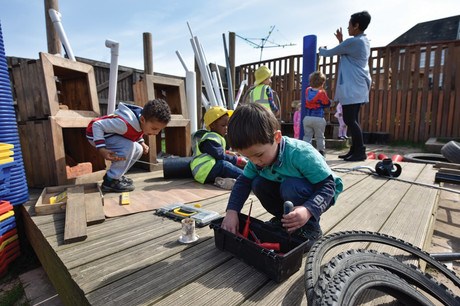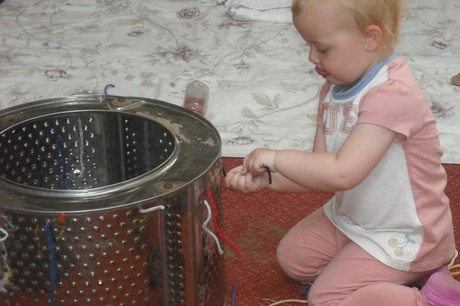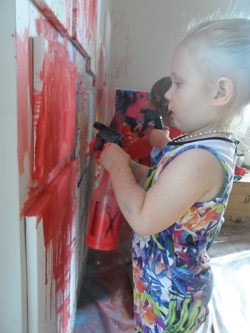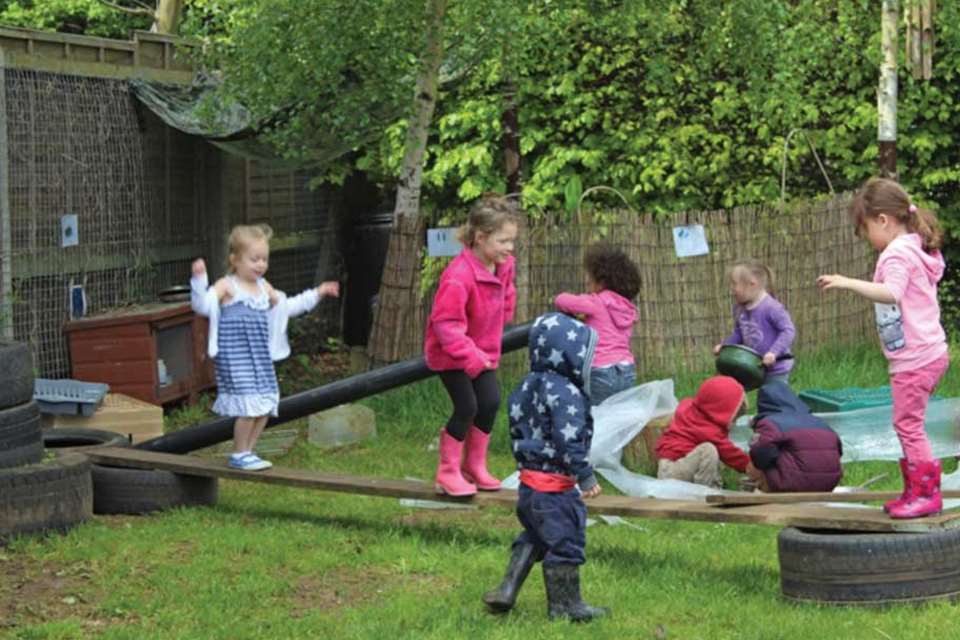Nursery Equipment: Loose Parts - Feeling empowered
Ruth Thomson
Monday, May 16, 2016
Providing children with access to loose parts materials enables them to use their imaginations in an endless variety of ways. Nicole Weinstein provides some examples of useful resources

Loose parts are materials that can be played with in an open-ended way. They include man-made and natural resources and can be large or small scale, such as stones, sticks, cones, shells, logs, planks, crates, tyres, cable drum, pipes, ropes, tubes and more. Often these materials can be found, recycled or bought and, to maximise the play opportunities, practitioners should offer a wide range of resources that are changed and added to regularly. These resources promote imagination, creative thinking, physical dexterity and collaborative play. They also enable children to shape their play without adult direction.
BENEFITS
Juliet Robertson, education consultant specialising in outdoor learning and play, says that loose parts play is becoming more popular in nursery settings because of the open-ended possibilities attached to it. ‘Using loose parts adds depth and richness to play. Children need to be able to use real resources in their play, not just toys. Many education approaches such as the Steiner Waldorf system or Montessori classes advocate the need for real experiences in order to acquire life skills. Playing with a variety of loose parts assists with these approaches.’
The theory of loose parts was coined by architect Simon Nicholson in 1971, who argued that loose parts in our environment help empower our creativity and inventiveness. He suggested that a beach is a good example of a loose parts environment, with plenty of moveable and adaptable materials, such as sand, water, rocks and shells.

RESOURCES FOR OUTDOOR PLAY
Here is a list of key resources for building up an outdoor collection of loose parts:
Tyres can be rolled around; stacked up; sat in; hidden in; jumped in; filled up; used as planters; climbed on, etc. Ask local mechanics if they have old tyres they could donate, or buy a pack of four Tyres (£24.99) from www.cosydirect.com.
Bread and milk crates can be turned into a cosy sitting space with a few cushions. Children like to tie ropes on to them and pull them along the ground, and the holes are also useful for weaving. A large selection are available on www.ebay.co.uk; or try the 20pk Building Crates Collection (£240) from www.earlyexcellence.co.uk; or the Crate Expectations, 20pk (£125) and the Smaller Nesting Crates (6pk, £42.50), both from www.cosydirect.com.
Guttering can be cut into manageable sizes but children enjoy the satisfaction of being able to move big pieces themselves. Heavy-duty black guttering is the most robust and won’t break when they jump on it or try to bend it in interesting ways. Light-coloured guttering is good for when food colouring is added to water. It can be bought from most DIY shops with attachments for joining. Otherwise, www.cosydirect.com has a large selection. TTS Group sells six lengths of white plastic guttering (£29.95) at www.tts-group.co.uk, or try the Guttering, Pipes and Tubes water set (£330) from www.earlyexcellence.co.uk.
Ropes are a versatile resource which can be used to tie around trees or posts, shaken and waved around, or simply just stood on or held. Ensure that these are used with adult supervision and children know not to wrap them around themselves or each other. Visit Juliet’s blog on Big Rope Play (http://creativestarlearning.co.uk/early-years-outdoor/big-rope-play) and a post from Let the Children Play (www.letthechildrenplay.net/2010/11/building-rope-bridge.html). Buy a Set of Natural Ropes (£47.50) from www.earlyexcellence.co.uk, the Nylon Rope Set C – Corvus (£26.40) from www.mindstretchers.co.uk, or the Rope – Knot Tying (£4.99) from www.muddyfaces.co.uk.
Plastic pipes come in all shapes and sizes. The large plastic ones with corrugated exterior are usually found on building sites and are used to transport water underground. Large pipes like these are popular for rolling around; creating entrances to dens; crawling into or used as planters. Ask at construction sites or buy them direct from www.cosydirect.com. Try the Half Round Big Pipe (£62.50) or the Rainbow Pipes (£32.95).
Logs, stumps and wooden planks have a wide range of uses – from balancing beams, portable seating and construction. Try the Collection of Wood – 80 pieces (£299.99) from www.muddyfaces.co.uk, or the 1m Decking Lengths, 6pk (£18.99) from www.cosydirect.com..
Cable drums can be stacked, balanced, rolled, built with or used as tables. Try the Extra Large Cable Drum (£29.99) or the Recycled Cable Drum Construction Kit (£47.95), both from www.cosydirect.com.
Nets are great for creating dens, hammocks or getting trapped inside. Try the Cameo Netting (£29.99) from www.muddyfaces.co.uk. Children will love to climb inside fishing nets and pretend they are trapped inside.
Steering wheels can be attached to crates, boxes and fences for instant transport play. Find them from your local car scrap yard or buy the Uber Value Steering Wheel, 4pk (£14.95) from www.cosydirect.com.
For small-scale loose parts try your local Scrapstore – see www.scrapstoresuk.org. For ideas on play with natural small loose parts, see Keep it Simple, downloadable from http://roundedandgrounded.blogspot.co.uk.
The Cosy Complete Loose Parts Panacea (100+ items) is available to buy for £375 from www.cosydirect.com.
CASE STUDY: NEW BEGINNINGS NURSERY

One of the most striking features at New Beginnings, the 104-place local authority-run nursery at Southwick Primary School in Sunderland, is the 14-foot boat that’s docked in the nursery’s outdoor space. ‘It was given to us by the local yacht club,’ explains deputy manager Nicole Robson, who is not afraid to ask the local community to share their treasures.
The boat is being used for role play, but when it first arrived three years ago it was placed inside the nursery. Ms Robson says, ‘It has been used for all sorts, depending on the children’s interests. Some children put cushions in it and made it into a cosy reading space. Another time, they turned it into a mud kitchen.’
The boat is not the only weird and wonderful loose part in the nursery. There are wooden crates from abandoned shops; a weathered sea chest found in a side street; wheels, exhaust pipes and gear sticks from a scrap yard; bricks, wooden planks, old sinks and baths in the water play area. ‘When we started to introduce natural resources and loose parts play in 2009, our families were initially curious, seeking out their key person to investigate more,’ says Ms Robson.
 The nursery is based in a deprived area and Ms Robson was also keen to show families that they can access free resources. ‘We started off with cardboard boxes and we began to use them in role play. Through this form of play, we found out what the children’s interests were and, if they were interested in cars we went to the local scrap yard to get a gear box, a steering wheel and a windscreen wiper.
The nursery is based in a deprived area and Ms Robson was also keen to show families that they can access free resources. ‘We started off with cardboard boxes and we began to use them in role play. Through this form of play, we found out what the children’s interests were and, if they were interested in cars we went to the local scrap yard to get a gear box, a steering wheel and a windscreen wiper.
‘Our families are totally on-board with the idea and actively help us to source our loose parts. One of the dads came in to help us turn a bath tub into a sandpit.’
New Beginnings works with Elizabeth Jarman at creating Communication Friendly Spaces, www.elizabethjarmantraining.co.uk
www.southwickprimary.co.uk/our-school/new-beginnings
CASE STUDY: LIMETREE DAY NURSERY
When introducing the theory of loose parts play to staff in 2014, managers at the chain of five Limetree Day Nurseries in Charnwood, Leicestershire, gave each member of their team £3 and asked them to bring a resource of interest to the staff meeting. They were given a brief that it just needed to be a material and or natural resource that could be used to be creative.
They then worked in groups to come up with some fantastic creations.
Manger, Amy Harding, at the Barrow on Soar setting said, ‘This helped to give staff an idea of what learning experiences the children could get out of loose parts play. Not only was it good for team building skills but they have since found that they can understand a lot more about what interests and motivates a child based on the play scenarios that come up during this type of play.
‘Each nursery has an area dedicated to loose parts play but the resources are transported indoor and out and are used in every area, from the mud kitchen to the cosy, calming spaces where the babies use the safer, wooden, heuristic play pieces to unwind during sensory play.
‘It’s important to give the children the independence to use the resources all the time so we store the items in large hessian baskets and boxes that can easily be transported. We collect all types of materials on an ongoing basis – cotton reels, cardboard tubing, curtains hoops, recycled materials and boxes, shells, stones, wooden spoons, twigs and pine cones. In the deconstructed role play area, children use these to create new role play scenarios each day. They make lots of dens and hide-outs and they also make ice cream shops, doctors surgeries and spaceships.
‘We notice a lot of schemas coming out through loose parts play – some like to put the small items like curtain hole hoops into bags, boxes and wheelbarrow and move them around the setting and other like to sort and organise the small items like stones and buttons.’
For more information, visit
http://www.limetreedaynursery.co.uk/
www.facebook.com/LimeTreeDayNursery/?fref=ts
MORE INFORMATION
Introduction to loose parts, http://bit.ly/1PIFRpc by www.playpods.co.uk
Imagination playground in a box, http://bit.ly/1STNekS
Natural Play in Schools, http://bit.ly/1Uk5tiG
Juliet Robertson’s blog, http://bit.ly/1Th2FOa
Simon Nicholson’s 1971 paper The Theory of Loose Parts on Let the Children Play, http://bit.ly/1FKpy9l
The Little Book of Free and Found by Julie Mountain (Featherstone Education, 2014), available at www.amazon.co.uk/Little-Book-Free-Found-Ideas/dp/1472904095






